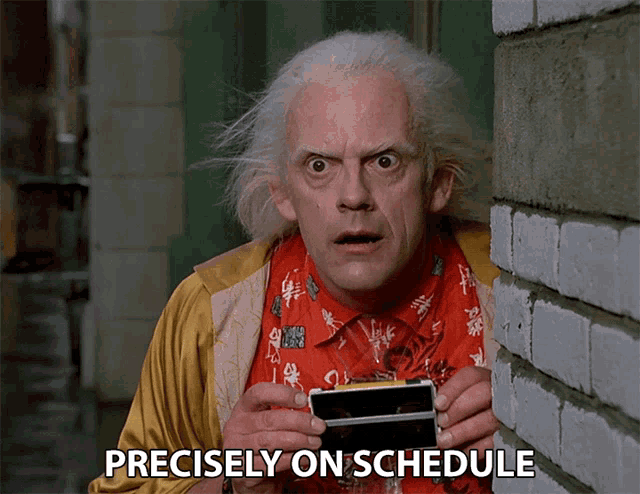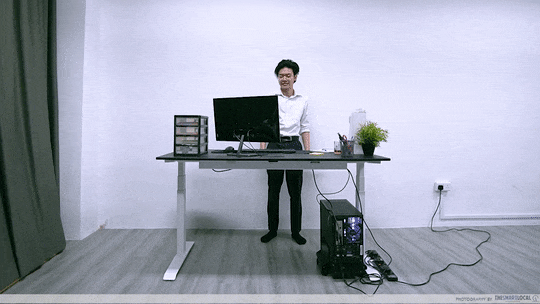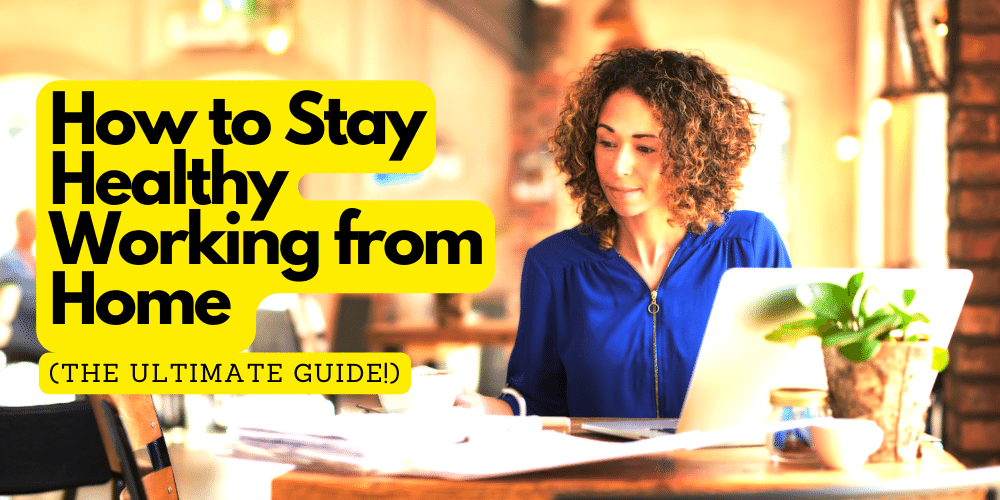Welcome to the ultimate guide on staying healthy while working from home!
As we all know there are pros and cons to working from home. Whether you're a seasoned pro at telecommuting or a newbie trying to navigate the world of remote work, it can be challenging to maintain good health and well-being.
But don't worry, we've got you covered with these 10 tips with specific ideas to put into action. So put down that bag of chips, stand up from your couch and let's get started!
Establish a regular routine
By establishing a regular routine with designated work and break times, you can help create a healthy work-life balance, increase your productivity and decrease the risk of burnout. This is especially challenging for working parents. It'll also help you stay focused and productive while working from home. Here are some specific ideas to get started:
- Set a specific start and end time for your workday, and stick to it as closely as possible. This can help you maintain a sense of structure and discipline, and prevent work from spilling over into your personal time.
- Take regular breaks throughout the day. This can include a mid-morning and mid-afternoon break, as well as a lunch break. Use this time to stretch, move around, or even take a quick walk outside.
- Use a timer or alarm to remind yourself to take breaks. This can help you stay on track and prevent yourself from getting too engrossed in your work.
- Use your breaks as an opportunity to disconnect from work and do something enjoyable or relaxing. This can include reading a book, listening to music, or even taking a short nap.
- Create a schedule for your day and week, including your work and break times and stick to it. This can help you stay organized and focused on what you need to get done.

Have a dedicated workspace
Having a dedicated workspace that is comfortable and ergonomic can be essential for maintaining good posture and preventing physical discomfort while working from home. Here are a few specific tips and ideas for setting up a dedicated workspace:
- Invest in a comfortable chair that supports your lower back and allows you to sit with good posture. An ergonomic chair can be a good option, as it is designed to reduce strain on the back and neck.
- Set up your computer and keyboard at the right height and distance to prevent strain on your eyes, neck, and shoulders. Your computer screen should be at or slightly below eye level and your keyboard should be at a comfortable arm's length.
- Make sure your workspace is well-lit. Natural light is best, but if that's not possible, consider investing in a desk lamp to provide additional light.
- Keep your workspace clean and organized. A cluttered workspace can be distracting and contribute to feelings of stress and anxiety.
- Use a footrest or a small box to elevate your feet and keep your legs at a 90-degree angle. This can help prevent strain on your lower back and legs.
- Consider using a standing desk or a sit-stand workstation. This can help you change positions throughout the day and reduce muscle strain.

Take regular breaks and move around
It's important to remember that sitting for extended periods of time can lead to physical discomfort and fatigue, so it's essential to take regular breaks to stretch and move your body. Regular breaks can also help improve your focus, productivity and mental well-being. The key is to be consistent and make it a habit, and it'll be easier to follow through with it.
- Use your breaks to move your body and stretch. This can include going for a quick walk outside, doing some stretching exercises, or simply standing up and moving around your space.
- Incorporate exercises that can be done sitting in your chair, such as neck rolls, shoulder shrugs, or ankle circles.
- Consider using a standing desk or a sit-stand workstation, this can help you change positions throughout the day and reduce muscle strain.
- Use your breaks as an opportunity to disconnect from work and do something enjoyable or relaxing. This can include listening to music, reading a book, or even taking a short nap.
Practice good posture
Practicing good posture while working can be a simple yet effective way to prevent back and neck pain. Here are a few specific tips and ideas:
- Sit up straight and keep your shoulders back. This helps to prevent slouching and can help to engage your core muscles.
- Position your computer screen at or slightly below eye level to prevent straining your neck.
- Keep your feet flat on the floor and your knees at a 90-degree angle.
- Use a lumbar roll or a small pillow to support the natural curve of your lower back.
- Use an ergonomic chair or adjust your existing chair to provide proper support for your back.
- Take regular breaks to stand up and move around, this will help you avoid getting stiff and maintains good posture.
Incorporate physical activity or a workout
Incorporating physical activity into your daily routine is an important aspect of maintaining good health while working from home. The key is to find activities that you enjoy so it'll be easier to stick to. Here are a few specific tips and ideas:
- Schedule regular physical activity into your day, such as a morning workout or an evening walk. Use an app or a timer to remind yourself when it's time to exercise.
- Make use of the equipment you have at home, such as resistance bands, free weights, or a yoga mat.
- Take advantage of online workout classes, there are a variety of options available for all fitness levels and interests, from yoga and Pilates to high-intensity interval training (HIIT) and cardio.
- Take a walk outside, even a short one, during your lunch break or after work. Fresh air and natural light can boost your energy and mood.
- If you can't go outside, try indoor activities such as dancing, jumping jacks, or even cleaning your house.
- Make use of a fitness tracker, it can be a great way to track your progress and keep you motivated.
- Schedule a 1-on-1 coaching call with a personal trainer. My top pick here is kpd.fit 💪
Eat a healthy diet
Eating a healthy diet can help you maintain energy levels, improve your mood, and prevent illness. Avoiding junk food is also important to prevent weight gain and improve your overall health. It's important to find a balance and not to be too restrictive, allowing yourself some treats every now and then, so you don't feel deprived. The key is to make healthy choices the majority of the time and to be mindful of what you're eating. Keep in mind, there's also a difference between hunger and appetite.
- Plan your meals in advance, this can help you make healthier choices and avoid last-minute decisions.
- Stock up on healthy foods, such as fruits, vegetables, whole grains, lean proteins, and healthy fats. According to KPD Fit, greek yogurt is a great choice because it's high in protein and keeps you full.
- Keep junk food out of your house or at least out of reach, this can help you avoid impulsive snacking.
- Drink plenty of water throughout the day, this can help you stay hydrated and avoid overeating.
- Use smaller plates and bowls, this can help you control portion sizes.
- Take your time when eating, this can help you eat more mindfully and avoid overeating.
- Try to eat home-cooked meals as often as possible, this can help you control the ingredients and portion sizes.
- Consider keeping a food diary, it can help you keep track of what you're eating and make healthier choices.
Stay hydrated
Staying hydrated is essential for maintaining energy levels, preventing fatigue, and supporting a healthy metabolism. Drinking enough water can also help improve your skin, digestion, and overall health. It's important to listen to your body and drink water when you feel thirsty, and not to wait for the reminders. The key is to make it a habit, and it'll be easier to follow through with it.- Keep a water bottle nearby, this can help you remember to drink water throughout the day.
- Set reminders on your phone or computer to drink water at regular intervals.
- Drink a glass of water before and after each meal.
- Try to drink water instead of sugary drinks, such as soda or juice.
- Add some flavor to your water by adding a slice of lemon, lime, cucumber, or mint.
- Invest in a water filter or a water pitcher with a filter, this can help you drink more water if you don't like the taste of tap water.
- Use a water bottle with measurements, this can help you track how much water you're drinking.
- Try to drink at least 8 cups of water a day, or more if you are physically active or it is hot.
Get enough sleep
Getting enough sleep is essential for maintaining energy levels, preventing burnout, and supporting a healthy metabolism. It's also important for maintaining mental and emotional well-being, and overall health. It's important to aim for 7-9 hours of sleep per night, and to listen to your body, if you feel the need for more or less sleep.
- Establish a regular sleep schedule, this can help regulate your body's internal clock and improve the quality of your sleep.
- Try to go to bed and wake up at the same time every day, even on weekends.
- Create a bedtime routine, this can help signal to your body that it's time to sleep.
- Make sure your bedroom is dark, quiet, and at a comfortable temperature.
- Avoid screens for at least an hour before bed, the blue light from screens can interfere with your ability to fall asleep.
- Exercise regularly, but avoid vigorous exercise for at least 2 hours before bed.
- Avoid caffeine, nicotine, and alcohol close to bedtime.
- Avoid eating heavy meals close to bedtime.
- Consider using earplugs or a white noise machine, if you're sensitive to noise.
Make time for social connections
Making time for social connections is important for maintaining mental and emotional well-being, and can also be a great way to reduce stress and anxiety. It's important to find balance and not to overdo it, and to make time for yourself as well.
- Schedule regular virtual catch-ups with friends and family, this can help you stay connected and supported.
- Join virtual clubs, groups or communities that align with your interests, this can help you connect with like-minded individuals.
- Consider volunteering for a virtual cause, this can be a great way to connect with others who share your values.
- If it's safe to do so, plan in-person meetups with a small group of friends or family, following safety guidelines.
- Take advantage of social media, but use it mindfully, it can be a great way to stay connected, but it can also be a source of stress and anxiety.
- Use the phone or video call instead of text message or email to communicate with friends and family.
- Make time for hobbies and interests that you enjoy and that involve social interaction, such as playing an instrument, joining a sports team, or taking a class.
Practice stress management
Practicing stress management techniques like meditation and yoga can help you reduce stress and anxiety, improve your mood, and increase your ability to focus. It's important to find what works best for you and to be consistent with your practice. Remember to be patient with yourself and to not compare yourself to others, as you're unique and your progress may be different than others.
- Schedule regular time for meditation or yoga, this can help you create a routine and make it a habit.
- Take advantage of free guided meditations and yoga videos available online.
- Try different techniques and find what works best for you.
- Consider using a meditation or yoga app, many of them have free trials or offer a free version.
- Create a comfortable space for meditation or yoga, this can help you get into the right mindset.
- Incorporate breathing exercises into your day, this can be done anytime, anywhere, and can help you feel more calm and focused.
- Use aromatherapy, essential oils, or candles to create a peaceful environment.
- Take a break and go outside, nature can be a great source of relaxation.
Working from home can present unique challenges when it comes to maintaining good health and well-being, but with a little bit of effort and a lot of self-care, you can create a healthy work-life balance. As you can see, there are many ways to take control of your health and feel your best while working from home. A little bit of consistency and effort can go a long way.
Remember, you can't pour from an empty cup, so take care of yourself, and you'll be able to tackle whatever comes your way!

Comments